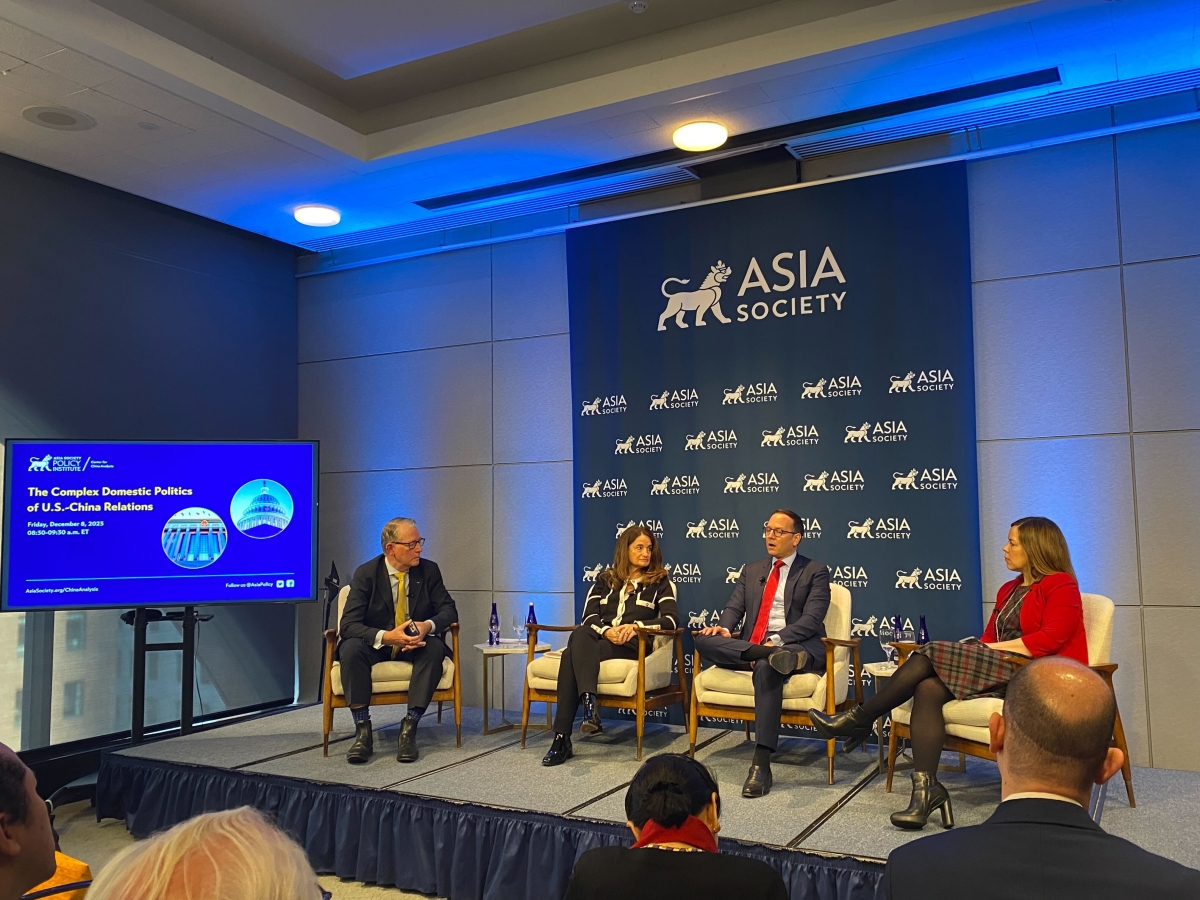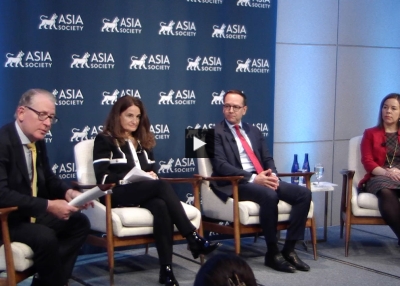The Domestic Politics of U.S.-China Relations: A Conversation with Evan Medeiros, Elizabeth Economy, and Liza Tobin

NEW YORK, December 8, 2023 — “We are now moving into an era where domestic politics will be just as important as geopolitics — if not more important — in influencing China policy in the U.S. and U.S. policy in China,” says Asia Society Policy Institute (ASPI) Center for China Analysis Senior Fellow Evan Medeiros.
However, in recent years there has been little research on how domestic political contexts in both countries have changed, both as a cause and effect of accelerating U.S.-China competition. To fill this gap, ASPI’s Center for China Analysis has released a new report entitled “The New Domestic Politics of U.S.-China Relations,” authored by Medeiros.
The report was officially launched at an event on December 8, where Medeiros spoke with Elizabeth Economy, Senior Fellow, Hoover Institution; and Liza Tobin, Senior Director for Economy, Special Competitive Studies Project about the report findings and the challenges of formulating China policy in Washington. Bates Gill, Executive Director of Asia Society Policy Institute's Center for China Analysis moderated the conversation.
"The report provides a terrific typology on the relevant actors in the U.S.-China relationship," said Economy. “In particular with the decline of the role of the U.S. business community, which I think Evan details in really important ways. That was a community that supported a really pro-active and robust U.S.-China relationship.”
Tobin agrees. “Ten or twenty years ago, there was a lot more unity in the business lobby pushing coherently for more opening with China,” she says. “Now it is quite fractured, so you have much smaller coalitions of business actors pushing for things. It kind of cancels each other out and kind of nullifies some of what used to be a unified voice.”
The influence of the business lobby first began to weaken in the early 2010s. “We began to have problems with China in tech — in particular, cyber-enabled economic espionage — during that time,” shared Medeiros. “Facebook and Google thought that they were going to get into China but had a really hard time. Those were the early stages of the fracturing of the business community — or the diversification of [opinion within] the business community — towards China.”
While Medeiros’ report finds that the U.S. business lobby’s influence on U.S.-China relations has weakened, it concluded that Congress has become the new locus of policymaking on China. “[Congress is] incredibly active in both their legislative authorities as well as their oversight authorities,” said Medeiros. “You have things like the trip of former house speaker Nancy Pelosi to Taiwan...You have the select committee on the CCP. [These are] all areas where Congress is not just shaping the environment and putting boundaries around the executive branch, but directing actions.”
Electoral politics are also increasingly influential in shaping U.S. policy towards China. “We’re in the early stages of the Republican primary right now and China is a very high-profile issue,” said Medeiros. “One of the most high-profile candidates, Nikki Haley, her first high-profile speech after announcing her bid was all about China. Same thing at down ballot elections.”
Meanwhile, in China, President Xi Jinping has centralized his power and decision-making capacities on U.S. relations. The report notes: “These changes have created and sustained incentives to see the U.S. as a long-term strategic and ideological adversary and, as a result, to minimize communication and cooperation.” This is true even when immediate economic and political needs require tactical diplomatic adjustments, such as following the November 2023 Biden-Xi summit.
“If we attribute [U.S.-China tension] mainly to Xi Jinping himself...then maybe we’ll have hope of getting back on the right track and reducing tensions [once Xi is out of power],” said Tobin. “But if the decline is mainly attributable to structural and ideological factors, then we’re not waiting around for Xi Jinping, we are in a position of long-term rivalry.”
When asked the potential of leveraging domestic politics to improve U.S.-China relations, Medeiros responded: “What’s painfully clear from the data about American public opinion towards China is that it has become very negative, very quickly...what I’d like to see is a more robust public debate about these issues, understanding that policy makers are going to come out in different places.”
Economy agrees that dialogue is critical. “To me, one of the most important things is getting American students back in China...and having Chinese scholars come here” said Economy. “We need to get back to the place where that kind of exchange is welcome and where the people travelling feel safe...Without that, you’re dealing not only with a public that is concerned and potentially informed, but increasingly with a public that is not informed.”
Read the report, “The New Domestic Politics of U.S.-China Relations,” here.

